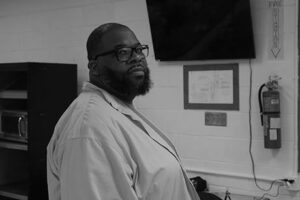by Victor Davis
(NOTICE: AS REQUESTED BY THE AUTHOR, THIS ARTICLE WAS NOT EDITED.)
Approximately one month ago, I had the privilege of attending the evening service and listen to the instructions of Don Coleman, pastor of Highland Baptist assembly, give a sermon over 2 Timothy chapter l . Regarding our responsibility as believers to “stir up, speak up, and stand up.” in accordance with our gifts. He taught us the Greek word for gift. Which is translated charisma in the Strong’s concordance #5486. It means a spiritual endowment.
Sha’ul was admonishing Timothy his spiritual son, to exhibit his gift with character as the leader of the Ephesians assembly, during the reign of the roman emperor Nero, approximately 54 to 68 A.D. Considering the inflictions that Sha’ul, and Timothy would have undergone as the fathers of this congregations in this period of time. I pondered as Don Coleman elaborated on the future Oppression, we as believers may have to encounter for the sake of the gospel.
I began to envision, and ponder in my heart, beginning with Yahshua himself being crucified, Stephen being stoned approximately 35 A.D. (Acts7:l-60). Ya’acob (Jacob) the son of Zebedee was beheaded by Herod Agrippa the 2nd. Kepha (Peter) was crucified A.D. 67, Sha’ul beging beheaded in A.D. 68, Ya’acob brother of Yahshua was slain near the temple in Jerusalem, and Yohanan (John) was exiled to the islands of Patmos in A.D. 100, as well as all of the old testament Nebi’im (prophets) that were martyred before them. Then my thoughts began to drift to all the people, around the world today being persecuted, because of their faith, in the messiah. Considering this, I reflected on it, and briefly cringed at the thought of having to endure such pain; but the Holy Spirit within me shouted with every fiber of my being. “I will not deny my Messiah”! I will be steadfast in heart with the character needed to overcome pressure, to represent his kingdom in adversity. While walking back from the unit from service, these thoughts consumed my mind. “I will not deny the gospel”! In connection with this I asked someone what he thought about Don Coleman’s exhortation. I stated sincerely to him that I was sold out for the edification of the Good News. To support this, I began paraphrasing John 6:48-69, but I couldn’t remember it word for word, and I didn’t have time to look it up before lock down to share it. When I entered into my cell and turned on my television to channel 26, the Church station; at that exact moment at 9:02 pm Rabbi Schneider was speaking on the exact passage and verses, I couldn’t locate while outside. Was it coincidental? Perhaps?! However, as he conveyed the scriptures, I listened intently. I’m not sure if it was due to the recent incidents in Paris, but I had never heard him preach the word with such ardor. I was attentive to his every remark as he spoke to the desires of my heart. After the program ended, I reread chapter 6 of Yohanan’s gospel.
Neither Yahshua nor any of his twelve Talmudim (disciples) was Levites or descendants of the Aaronic priesthood, but they all were familiar with that liturgy. In the Holy Place towards the left stood a golden menorah weighing 107 lbs, with seven branches on it. On the right across from it was a 3 ft long, 2 1/2 ft high, and 1 /2 1 wide table of showbread with twelve loaves upon it; accompanied with a vessel of wine. The twelve loaves represented the twelve tribes of Israel, and the wine, the blood, and life of the persons being offered to Yahweh, which in this case was the twelve tribes of Israel (Leviticus 17:1 1). When the Cohen (Priest) would perform this ceremony, by eating the loaves every Sabbath, and pouring out the wine (Leviticus 10:9) they were symbolically feeding on and receiving in themselves the life of Yahweh. Cohen were responsible for the holiness of the community, since the peoples offerings were only acceptable to Yahweh through them, but only the high priest could enter the Holy of Holies once a year to make atonement first for himself, and then for the nation (Exodus 25-37).
According to the gospel of Mattithyahu 26:26-28, Mark 14:22-24; Luke 22: 17-20. When Yahshua took matstsah (unleavened bread) blessed, and broke it, then gave it to his Talmudim, he said “take eat, this is my body, then he took the cup, and gave thanks, and gave it to them saying, drink from it, all of you, For this is my blood of the Brit Hadasha (new covenant) which is shed for the remission of sins”. To improve my interpretation of what he was saying to his taught ones that night, I borrowed a concordance, and performed a Greek word study on 7 themes of Yahshua ritual. l). #740 Bread (Artos) (4), “metaphorically of Christ as the bread of life.” 2). #4165 Feed (Pioman) means “overseer” 3). #4983 Body, (soma) (l la) means “reference to the church.” 4). #2806 Break (klao) “of the lords act in giving evidence of his resurrection. 5). #4221 Cup (Poterion) (2bl), “of the sufferings of Christ.” 6). #4095 Drink (Pino) “of drinking of the blood of Christ, in the sense of receiving eternal life, through his death.” 7). #2222 Life (Zoe) (lal), “which he gave to the incarnate son to have in himself.”
After the completion of this research, I compared, and contrasted the rites of Yahshua to that of the sacrificial system ordained by Yahweh in the Old Testament through the priesthood. How they had to offer themselves to make atonement on the behalf of the community to appease the wrath of Yahveh. Once I was able to translate it; this is the understanding I gained concerning this custom. “I am life (Artos) and by this doctrine (Klao), pastor, oversee (Pioman), those who believe in me (Soma). By doing this, you will subject yourself to the sufferings I have now, and will inflict (Poterion) The father has given me life in myself, since the life is in the blood, by accepting it, in you by faith (Pino), you will inherit eternal grace, through me is the promise (Zoe). (Mk 10:38-39); (Jn 5:26).
This is what Yohanan meant in 6:48-69 of his gospel when Yahshua said they would have to eat of his flesh, and drink of his blood. This is why many of his Talmudim went back, and walked with him no more. When Yahshua explained to them that they would have to apply his apostolic doctrine to their lives, and suffer for his names sake “therefore they said who can understand this”? In other words who could enter into a blood covenant with this? They wanted the rewards of being associated with his kingdom, but were unwilling to suffer persecution for it. This is the reason Yahshua states in verse 65. No man can come to him unless it is granted to him by his father, because their hearts have to be purified through faith.
After I received this revelation, I had to reexamine my own heart to see if I was ready to partake in the memorial meal, with the messiah, and the conclusion of this matter is; “brothers, I do not count myself to have laid hold of it yet, but only this; forgetting what is behind, and reaching out for what lies ahead, I press on toward the goal for the prize of the high calling of Yahveh in Yahshua Messiah. (Philippians 3:14-15) Not only that, I also have come to believe, and know that he is the Messiah, the son of the living Yah! He has the words of eternal life. (Bible verses in this article are from “The Scriptures Version.”)





Be First to Comment